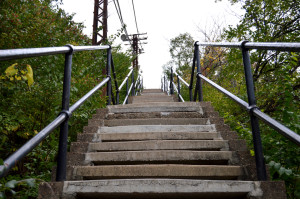
The South Side steps, formally known as the City Steps, become icy and slick in the wintertime, according to students who have received injures from them.
By Brandon Addeo and Casey Chafin | The Duquesne Duke
Taryn Maleski’s hand reached out, desperately grabbing for something to help her keep her balance, but it was too late. She pitched forward down the icy South Side steps, and felt lucky to walk away with nothing worse than a sprained wrist.
“I can’t imagine what would happen if someone would have slipped and hit their head,” said the 21-year-old mathematics and education major, who slipped on the steps behind Towers during the spring semester.
As winter approaches, Maleski and several other Duquesne students are concerned that the South Side steps, officially called the City Steps, present a safety hazard.
Maleski said her wrist was fine after about a day, but she said she could have just as easily injured her head or suffered a more serious injury.
The steps are owned and maintained by the city of Pittsburgh, not Duquesne University, according to Mike Gable, director of Pittsburgh Public Works. Although Duquesne cannot buy the steps, Gable said, there are ways in which the school could take some responsibility for them.
According to Gable, the city does have agreements with several community groups that maintain various steps throughout the city.
“We could certainly enter into a lease agreement, or a maintenance agreement to give them a level of responsibility that they could put in maintenance or capital,” he said, “but we couldn’t sell the steps outright.”
Under such an agreement, Duquesne could pay to repair the steps, which would cost approximately $100,000, according to Nash Golon, who works for a local construction firm and holds a masters in environmental and civil engineering from the University of Pittsburgh.
“To demolish the steps and pour all-concrete steps, you are looking at about $300,000 and to demolish the steps and remake them out of wood, you are looking at about $200,000,” Golon said.
By comparison, the university spent more than $4.5 million on the recently completed Genesius Theater, according to a university press release from last year.
Justin Aippersbach, 21, a health science major at Duquesne, slipped on a step during a rainy day this past spring and twisted his foot while falling.
“I just heard, like, a snap in my foot,” Aippersbach said. “So I knew it was bad.”
This was not the first time he fell down the steps — this past winter Aippersbach said he slipped on a patch of ice on the wooden portion of the steps.
After twisting his ankle, he walked using crutches for a week, which he said was difficult “with the hills” on Duquesne’s campus.
“With crutches you get out of breath just walking to the dining hall,” he said. “I couldn’t go to class that entire week … that kind of screwed up my semester grades.”
Pittsburgh employees use various methods to salt and clear the 700 outdoor staircases in the city, according to the city’s website. Steps are not always routinely cleared after a snow or ice storm, so Gable encouraged students who use the steps during the winter to contact Pittsburgh’s 311 service by dialing 311 or texting their concern to 412-573-9736.
“That’s like the mayor’s response line,” Gable said. “We like to have it channeled in there because then there’s a history and there’s a way to track it.”



